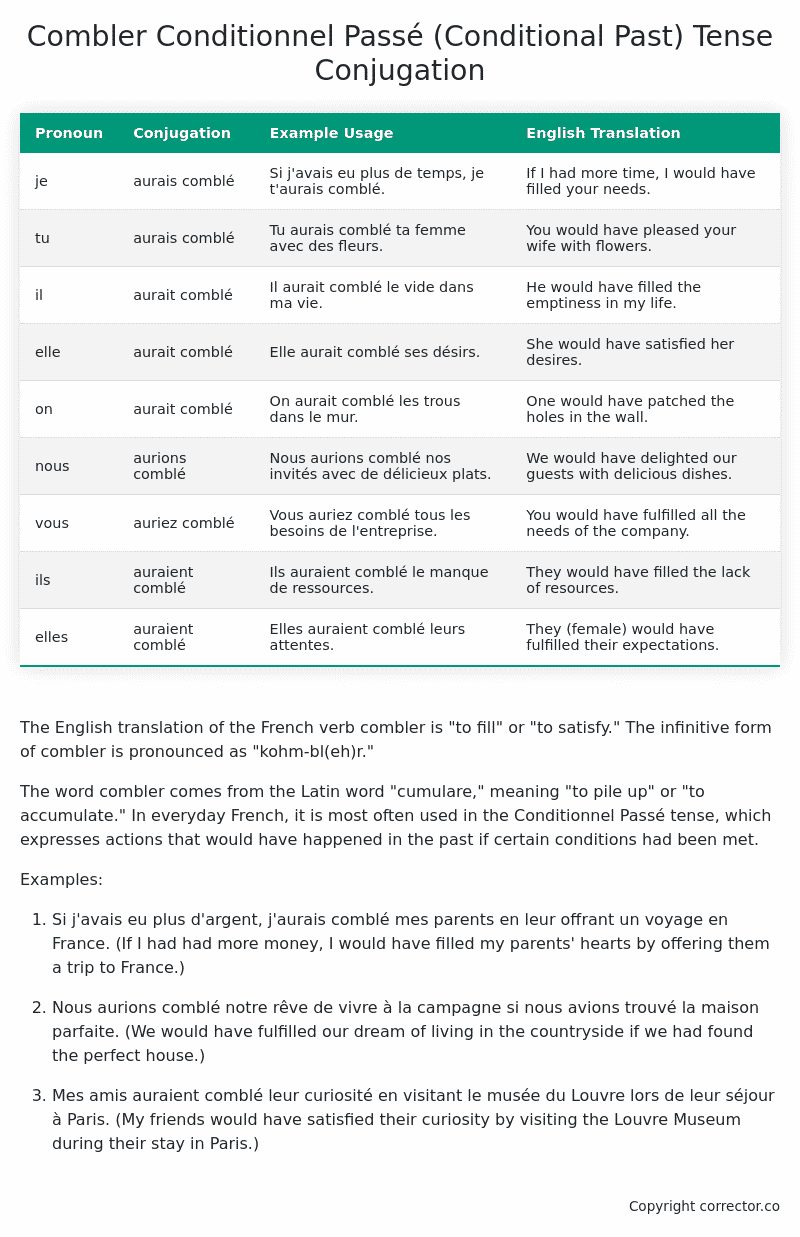Conditionnel Passé (Conditional Past) Tense Conjugation of the French Verb combler
Introduction to the verb combler
The English translation of the French verb combler is “to fill” or “to satisfy.” The infinitive form of combler is pronounced as “kohm-bl(eh)r.”
The word combler comes from the Latin word “cumulare,” meaning “to pile up” or “to accumulate.” In everyday French, it is most often used in the Conditionnel Passé tense, which expresses actions that would have happened in the past if certain conditions had been met.
Examples:
-
Si j’avais eu plus d’argent, j’aurais comblé mes parents en leur offrant un voyage en France. (If I had had more money, I would have filled my parents’ hearts by offering them a trip to France.)
-
Nous aurions comblé notre rêve de vivre à la campagne si nous avions trouvé la maison parfaite. (We would have fulfilled our dream of living in the countryside if we had found the perfect house.)
-
Mes amis auraient comblé leur curiosité en visitant le musée du Louvre lors de leur séjour à Paris. (My friends would have satisfied their curiosity by visiting the Louvre Museum during their stay in Paris.)
Table of the Conditionnel Passé (Conditional Past) Tense Conjugation of combler
| Pronoun | Conjugation | Example Usage | English Translation |
|---|---|---|---|
| je | aurais comblé | Si j’avais eu plus de temps, je t’aurais comblé. | If I had more time, I would have filled your needs. |
| tu | aurais comblé | Tu aurais comblé ta femme avec des fleurs. | You would have pleased your wife with flowers. |
| il | aurait comblé | Il aurait comblé le vide dans ma vie. | He would have filled the emptiness in my life. |
| elle | aurait comblé | Elle aurait comblé ses désirs. | She would have satisfied her desires. |
| on | aurait comblé | On aurait comblé les trous dans le mur. | One would have patched the holes in the wall. |
| nous | aurions comblé | Nous aurions comblé nos invités avec de délicieux plats. | We would have delighted our guests with delicious dishes. |
| vous | auriez comblé | Vous auriez comblé tous les besoins de l’entreprise. | You would have fulfilled all the needs of the company. |
| ils | auraient comblé | Ils auraient comblé le manque de ressources. | They would have filled the lack of resources. |
| elles | auraient comblé | Elles auraient comblé leurs attentes. | They (female) would have fulfilled their expectations. |
Other Conjugations for Combler.
Le Present (Present Tense) Conjugation of the French Verb combler
Imparfait (Imperfect) Tense Conjugation of the French Verb combler
Passé Simple (Simple Past) Tense Conjugation of the French Verb combler
Passé Composé (Present Perfect) Tense Conjugation of the French Verb combler
Futur Simple (Simple Future) Tense Conjugation of the French Verb combler
Futur Proche (Near Future) Tense Conjugation of the French Verb combler
Plus-que-parfait (Pluperfect) Tense Conjugation of the French Verb combler
Passé Antérieur (Past Anterior) Tense Conjugation of the French Verb combler
Futur Antérieur (Future Anterior) Tense Conjugation of the French Verb combler
Subjonctif Présent (Subjunctive Present) Tense Conjugation of the French Verb combler
Subjonctif Passé (Subjunctive Past) Tense Conjugation of the French Verb combler
Subjonctif Imparfait (Subjunctive Imperfect) Tense Conjugation of the French Verb combler
Subjonctif Plus-que-parfait (Subjunctive Pluperfect) Tense Conjugation of the French Verb combler
Conditionnel Présent (Conditional Present) Tense Conjugation of the French Verb combler
Conditionnel Passé (Conditional Past) Tense Conjugation of the French Verb combler (this article)
L’impératif Présent (Imperative Present) Tense Conjugation of the French Verb combler
L’infinitif Présent (Infinitive Present) Tense Conjugation of the French Verb combler
Struggling with French verbs or the language in general? Why not use our free French Grammar Checker – no registration required!
Get a FREE Download Study Sheet of this Conjugation 🔥
Simply right click the image below, click “save image” and get your free reference for the combler Conditionnel Passé tense conjugation!

Combler – About the French Conditionnel Passé (Conditional Past) Tense
Formation
Common Everyday Usage Patterns
Expressing Unreal Past Scenarios
Polite Requests or Suggestions
Expressing Doubt or Uncertainty
Interactions with Other Tenses
Conditional Present
Indicative Past Tenses
Conditional Future
Summary
Want More?
I hope you enjoyed this article on the verb combler. Still in a learning mood? Check out another TOTALLY random French verb conjugation!


